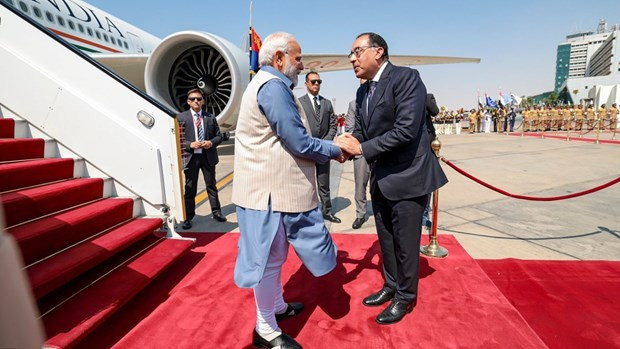During a two-day official visit, Indian Prime Minister Narendra Modi and Egyptian President Abdel Fattah El-Sisi signed a joint statement on upgrading the bilateral relations to Strategic Partnership, said the spokesman of the Egyptian Presidency.
The two leaders also discussed promoting Egypt-India cooperation in a wide range of fields, including economy, trade, investment, renewable energy, green hydrogen, pharmaceuticals, food security, education, media, information technology and defence, as well as regional and international issues.
Notably, Prime Minister Modi’s visit to Egypt came just a few months after President El-Sisi visited India. In January 2023, the President of Egypt was one of the main guests to India’s Republic Day celebrations. Prime Minister Modi emphasised that both high-level visits in such a short period reflected the rapid and strong development of the India-Egypt partnership.
International political observers point to many factors driving India and Egypt to get closer together. The two countries have long had close ties, as they were founding members of the Non-Aligned Movement (NAM) in 1961, a global forum of developing nations. Egypt considers India an important partner and almost all the Presidents and Prime Ministers of Egypt have visited India. In recent years, Egyptian President El-Sisi has visited India three times.
The Egyptian economy faced many difficulties after the COVID-19 pandemic and was strongly affected by the conflict in Ukraine. The food security of Egypt, the world’s largest wheat importer, was severely affected due to disruption in supplies from Russia and Ukraine. The North African country imports almost 80% of its grain from Russian and Ukrainian producers. The declining economic growth prospect has caused foreign investors to withdraw billions of US dollars from the Egyptian market.
In this context, India is one of Cairo’s top trusted partners. Trade exchange between Egypt and India in 2022 increased by 13.7% over the previous year. In 2022, despite restricting wheat exports to protect domestic reserves, India still shipped tens of thousands of tonnes of food to Egypt. More than 50 Indian companies are currently operating in Egypt, with a total investment of 3.15 billion USD, creating jobs for about 38,000 Egyptian workers. Ahead of Prime Minister Modi’s visit to Cairo, an Indian company pledged to build a 12 billion USD green hydrogen plant in the Suez Canal Economic Zone.
Meanwhile, Cairo plays an integral role in India’s Indo-Pacific strategy, as well as India’s Africa policy. In the Arab community, Egypt is the largest country and a major economy, one of India’s key trading partners in the North Africa-Middle East region. Egypt’s geostrategic location is particularly important as 12% of global trade is handled through the Suez Canal each year. Cairo is the gateway for Indian goods to find major markets in both Europe and Africa.
Egypt expressed its respect for Prime Minister Modi’s visit by conferring the Indian leader with the ‘Order of the Nile’, Egypt’s highest honour. Responding to Egypt’s warm sentiments, in a post on Twitter, Indian Prime Minister Modi hailed his visit to Egypt as a “historic trip”, invigorating India-Egypt relations and bringing practical benefits to the people of the two countries.
















